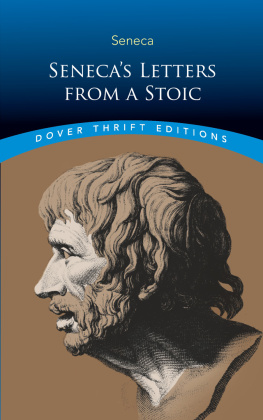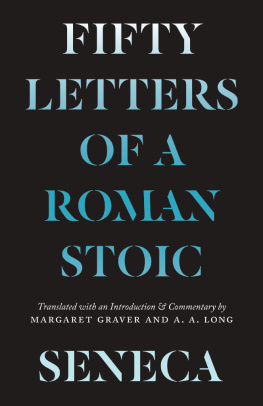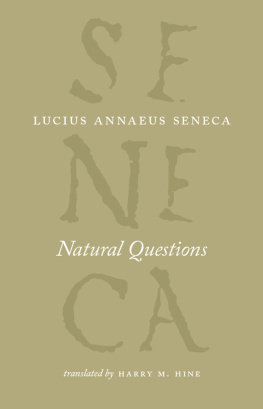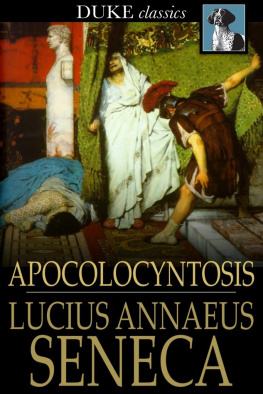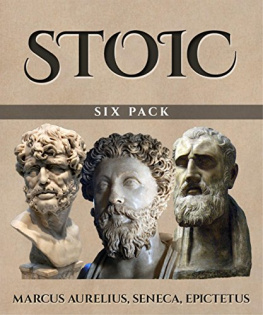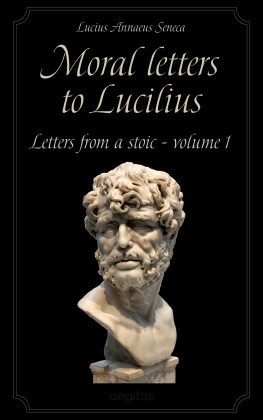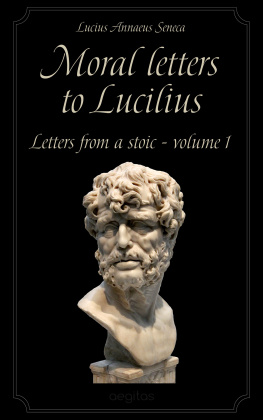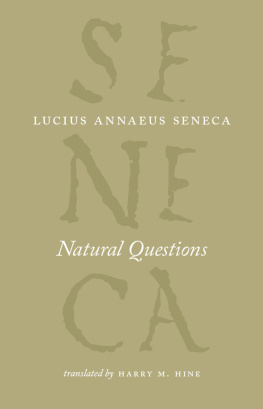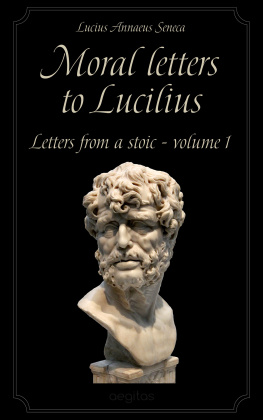SENECAS LETTERS FROM A STOIC

Lucius Annaeus Seneca
Translated by
Richard Mott Gummere
DOVER PUBLICATIONS, INC.
MINEOLA, NEW YORK
Bibliographical Note
This Dover edition, first published in 2016, is a republication of the Richard Mott Gummere translation of Letters from a Stoic: Epistulae Morales AD Lucilium, originally published in three volumes by William Heinemann, London, 191725 and G. P. Putnams Sons, New York, in 1918 and reprinted in 1925.
Library of Congress Cataloging-in-Publication Data
Names: Seneca, Lucius Annaeus, approximately 4 B.C.65 A.D., author. | Gummere, Richard M. (Richard Mott), 18831969, translator.
Title: Seneca's Letters from a stoic / Lucius Annaeus Seneca ; translated by Richard Mott Gummere.
Other titles: Epistulae morales ad Lucilium. English | Letters from a stoic
Description: Mineola, New York : Dover Publications, 2016. | Series: Dover thrift editions | "This Dover edition of Seneca's Letters from a Stoic, first published in 2016, is a reprint of Letters from a Stoic: Epistulae Morales AD Lucilium, first published in three volumes, 191725 by William Heineman (London) and G.P. Putnam's Sons (New York) in 1918 and reprinted in 1925. The translation is by Richard Mott Gummere."
Identifiers: LCCN 2016023951| ISBN 9780486811246 (paperback) | ISBN 0486811247
Subjects: LCSH: EthicsEarly works to 1800. | Conduct of lifeEarly works to 1800. | BISAC: PHILOSOPHY / History & Surveys / Ancient & Classical.
Classification: LCC BJ214.S4 E7 2016 | DDC 188dc23 LC record available at https://lccn.loc.gov/2016023951
Manufactured in the United States
81124701 2016
www.doverpublications.com
Contents
LETTER
Introduction
AMONG THE PERSONALITIES of the early Roman Empire there are few who offer to the readers of today such dramatic interest as does Lucius Annaeus Seneca, the author of the Epistles which are translated in this volume. Born in a province, educated at Rome, prominent at the bar, a distinguished exile, a trusted minister of State, and a doomed victim of a capricious emperor, Seneca is so linked with the age in which he lived that in reading his works we read those of a true representative of the most thrilling period of Roman history.
Seneca was born in the year 4 BC, a time of great opportunity, at Corduba (now Cordoba), in Spain, son of the talented rhetorician Annaeus Seneca. We gather that the family moved to Rome during the boyhood of Lucius, that he was educated for the bar, and that he was soon attracted by the Stoic philosophy, the stern nurse of heroes during the first century of the Empire. That his social connexions were distinguished we infer from the prominence and refinement of his brother Galliothe Gallio of the New Testamentfrom the fact that he himself was noticed and almost condemned to death by the Emperor Caligula soon after he began to speak in public, and especially because his aunt, whom he visited in Egypt, was the wife of the governor of that country.
Up to the year 41 he prospered. He makes mention of his children, of his mother who, like the mother of Goethe, seems to have imbued him with idealism and a certain amount of mysticism, and of many valued friends. But during that year, as a result of court intrigue, he was banished to the island of Corsica. The charge against him was a too great intimacy with Iulia Livilla, unfortunate sister of the late emperor, and the arch-foe of Messalina, whose husband, Claudius, had recalled the princess from exile. We may discount any crime on Senecas part because even the gossip-laden Suetonius says: The charge was vague and the accused was given no opportunity to defend himself.
The eight years of exile were productive of much literary work. The tragedies, which have had such influence on later drama, are the fruit of this period, besides certain essays on philosophic subjects, and a rather cringing letter to Polybius, a rich freedman at the court of Claudius. In 49, however, Fortune, whom Seneca as a Stoic so often ridicules, came to his rescue. Agrippina had him recalled and appointed tutor to her young son, later to become the Emperor Nero. Holding the usual offices of state, and growing in prominence, Seneca administered the affairs of the prince, in partnership with Burrus, the praetorian. Together they maintained the balance of power between throne and Senate until the death of Burrus in the year 62. After that time, a philosopher without the support of military power was unable to cope with the vices and whims of the monster on the throne.
The last two years of Senecas life were spent in travelling about southern Italy, composing essays on natural history and relieving his burdened soul by correspondence with his friend Lucilius. In the year 65 came his suicide, anticipating an act of violence on the Emperors part; in this deed of heroism he was nobly supported by his young wife Paulina. The best account of these dark days is given in Tacitus.
These letters are all addressed to Lucilius. From internal evidence we gather that the native country of this Lucilius was Campania, and his native city Pompeii or Naples. He was a Roman knight, having gained that position, as Seneca tells us, by sheer industry. Prominent in the civil service, he had filled many important positions and was, at the time when the Letters were written, procurator in Sicily. He seems to have had Epicurean tendencies, like so many men from this part of Italy; the author argues and tries to win him over to Stoicism, in the kindliest manner. Lucilius wrote books, was interested in philosophy and geography, knew intimately many persons in high places, and is thought by some to be the author of the extant poem Aetna.
When their friendship began we cannot say. The Naturales Quaestiones and the Letters are the work of Senecas closing years. Both are addressed to Lucilius. The essay De Providentia, which was also dedicated to him, is of doubtful date, and may be fixed at any time between the beginning of the exile in Corsica and the period when the Letters were written.
In spite of the many problems which confront us, it may be safely said that the years 6365 constitute the period of the Letters. We find possible allusions to the Campanian earthquake of 63, a reference to the conflagration at Lyons, which took place either in 64 or in 65, and various hints that the philosopher was travelling about Italy in order to forget politics. The form of this work, as Bacon says, is a collection of essays rather than of letters. The recipient is often mentioned by name; but his identity is secondary to the main purpose. The language at the beginning of the seventy-fifth letter, for example, might lead one to suppose that they were dashed off in close succession: You complain that you receive from me letters which are rather carelessly written; but the ingenious juxtaposition of effective words, the balance in style and thought, and the continual striving after point, indicate that the language of the diatribe had affected the informality of the epistle.
The structure of each letter is interesting. A concrete fact, such as the mention of an illness, a voyage by sea or land, an incident like the adventure in the Naples tunnel, a picnic party, or an assemblage of friends who discuss questions from Plato, or Aristotle, or Epicurusthese are the elements which serve to justify the reflections which follow. After such an introduction, the writer takes up his theme; he deals with abstract subjects such as the contempt of death, the stout-heartedness of the sage, or the quality of the Supreme Good. We shall not mention the sources of all these topics in footnotes, but shall aim only to explain that which is obscure in meaning or unusual in its import. Platos Theory of Ideas, Aristotles Categories, Theophrastus on Friendship, Epicurus on Pleasure, and all the countless doctrinal shades of difference which we find in the Stoic leaders, are at least sketched in outline.

